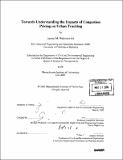| dc.contributor.advisor | Joseph M. Sussman. | en_US |
| dc.contributor.author | Waliszewski, Janine M | en_US |
| dc.contributor.other | Massachusetts Institute of Technology. Dept. of Civil and Environmental Engineering. | en_US |
| dc.date.accessioned | 2006-02-02T18:52:00Z | |
| dc.date.available | 2006-02-02T18:52:00Z | |
| dc.date.copyright | 2005 | en_US |
| dc.date.issued | 2005 | en_US |
| dc.identifier.uri | http://hdl.handle.net/1721.1/31139 | |
| dc.description | Thesis (S.M.)--Massachusetts Institute of Technology, Dept. of Civil and Environmental Engineering, 2005. | en_US |
| dc.description | Includes bibliographical references (p. 107-111). | en_US |
| dc.description.abstract | Understanding policy impacts on freight is essential for planners who have overlooked this transport group in the past and must evaluate new congestion alleviation policies with respect to regional economic and social goals. Since urban areas are limited in infrastructure expansion and travel demand continues to rise, congestion pricing is a potentially compelling policy alternative. This thesis focuses on measuring the impacts of congestion pricing policies on urban freight. We differentiate from prior studies which measure the impacts of urban freight and present tools to measure the impacts on urban freight according to three stakeholder groups: shippers, carriers, and the public sector. We recognize that the impacts of urban freight may be the motivators for policy change or project implementation and the continued study of these impacts is critical to the public sector who aims to minimize externalities of increasing truck traffic (and is also an urban freight stakeholder); however, we suggest that the impacts that these projects or polices have on freight is particularly important given the economic value associated with goods movement. For each of these stakeholder groups, we evaluate their goals, enumerate the possible responses to the scheme, and provide tools to quantify the impacts. First, we summarize the experiences of urban freight in other congestion pricing schemes and review several implementation decisions from the perspective of freight stakeholders. Second, we characterize possible freight responses to transportation improvement policies. Third, we expand previous freight impact analyses by quantifying the first-order impacts of the scheme for each stakeholder group. | en_US |
| dc.description.abstract | (cont.) Finally, we propose additional research extensions related to analyzing the higher-order impacts of freight and using the methods here as a means to introduce public- and private-sector collaboration. | en_US |
| dc.description.statementofresponsibility | by Janine M. Waliszewski. | en_US |
| dc.format.extent | 111 p. | en_US |
| dc.format.extent | 6174096 bytes | |
| dc.format.extent | 6187678 bytes | |
| dc.format.mimetype | application/pdf | |
| dc.format.mimetype | application/pdf | |
| dc.language.iso | eng | en_US |
| dc.publisher | Massachusetts Institute of Technology | en_US |
| dc.rights | M.I.T. theses are protected by copyright. They may be viewed from this source for any purpose, but reproduction or distribution in any format is prohibited without written permission. See provided URL for inquiries about permission. | en_US |
| dc.rights.uri | http://dspace.mit.edu/handle/1721.1/7582 | |
| dc.subject | Civil and Environmental Engineering. | en_US |
| dc.title | Towards understanding the impacts of congestion pricing on urban trucking | en_US |
| dc.type | Thesis | en_US |
| dc.description.degree | S.M. | en_US |
| dc.contributor.department | Massachusetts Institute of Technology. Department of Civil and Environmental Engineering | |
| dc.identifier.oclc | 61184565 | en_US |
